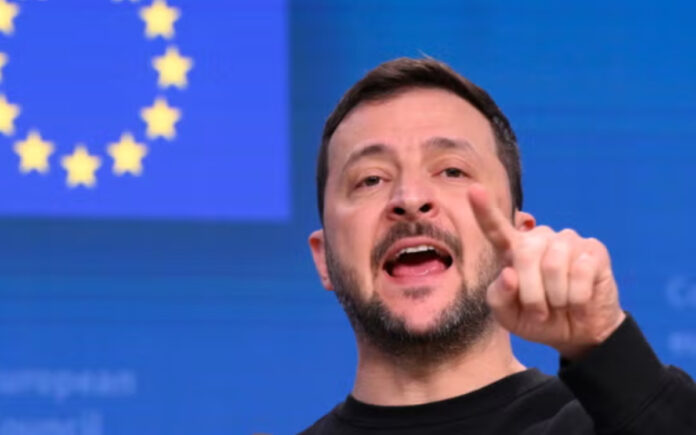Brussels: Ukrainian President Volodymyr Zelenskyy revealed on Thursday that his government has obtained intelligence indicating that North Korea is preparing to send 10,000 troops to support Russian forces in Ukraine. He warned that the involvement of a third nation in the ongoing conflict could escalate it into a “world war”. Zelenskyy’s claim came shortly after U.S. Deputy Secretary of State Kurt Campbell expressed concerns over North Korea’s military support for Russia, though he did not confirm that North Korean soldiers had already been deployed.
“From our intelligence, we’ve got information that North Korea sent tactical personnel and officers to Ukraine,” Zelenskyy stated during a press briefing at NATO headquarters. “They are preparing 10,000 soldiers, but they haven’t moved them to Ukraine or Russia yet.” He added that North Korea’s involvement would mark “the first step to a world war.”
NATO Secretary-General Mark Rutte acknowledged the concerns but noted, “We have no evidence that North Korean soldiers are involved in the fight. However, we do know that North Korea is supporting Russia in various ways—through weapons supplies, technological aid, and innovations—all of which are deeply troubling.”
These revelations place additional pressure on Zelenskyy’s Western allies as he continues discussions in Brussels with European Union leaders and NATO defense ministers regarding his “victory plan” to bring an end to the war.
Zelenskyy’s Victory Plan
Zelenskyy’s plan, which includes Ukraine’s aspiration to join NATO and use longer-range Western-supplied missiles to target military sites deep within Russia, has been met with some hesitation from Kyiv’s allies. “Ukraine truly deserves to become the 33rd NATO member one day, and we must do everything to ensure this happens,” Zelenskyy appealed to NATO members. He emphasized, “Ukrainians have shown we can defend shared values and are standing against Russia, the biggest threat to Europe and global peace.”
He also urged EU leaders to act swiftly, expressing optimism that the war could be concluded by next year if his plan is supported. Zelenskyy stressed that the success of the plan does not rely on Russia’s cooperation but on the will of Ukraine’s partners.
In a joint statement following their meeting, EU leaders called for “rapid stepping up of military support” for Ukraine, particularly in the areas of air defense, ammunition, and missiles, to protect the country’s population and infrastructure. “Russia must not prevail,” the statement declared.
Concerns from EU Members
While the EU remains a strong supporter of Ukraine, not all leaders are fully aligned with Zelenskyy’s vision. Hungarian Prime Minister Viktor Orbán, who has maintained a relatively warm relationship with Russian President Vladimir Putin, described Zelenskyy’s plan as “more than frightening” in a Facebook post. He urged major EU powers, including France and Germany, to initiate negotiations with Russia to find a peaceful resolution.
On the other hand, NATO allies remain steadfast in their commitment to Ukraine’s defense. “Kyiv can rest absolutely assured that 32 allies are united in making sure that collectively, we will do whatever is needed to ensure that Ukraine can prevail,” NATO’s Rutte assured. He reaffirmed Ukraine’s eventual place in the alliance but refrained from specifying a timeline for its membership.
Also Read | Boeing’s Starliner Stumbles, NASA Shifts Focus to SpaceX for 2025 Launches
Expanding the Fight to Russia
Zelenskyy also signaled a shift in strategy, stating that Ukrainian forces should continue their defensive efforts in Ukraine while extending operations into Russia. “Russians need to feel what war is like and begin to hate Putin for it,” he said, urging EU leaders to back this approach. He expressed confidence that unity within the EU could help influence not just European leaders but others globally.
The ongoing talks in Brussels come at a critical time, as Ukrainian forces face increasing challenges in the eastern Donetsk region, where Russian troops continue to advance. Despite receiving substantial Western aid, Ukraine has repeatedly called for faster delivery of military assistance.
Also Read | Russian Sports Minister Urges Dialogue with IOC Amid Tensions Over Olympic Ban
Growing Frustration
Lithuanian President Gitanas Nauseda voiced frustration over what he described as the West’s slow decision-making on military aid for Ukraine, warning that such hesitancy could be a mistake. “It would be a great mistake to think that our hesitance is the best way to de-escalation,” he cautioned.
At a NATO summit in Washington in July, the alliance’s 32 members declared Ukraine’s path to membership as “irreversible,” but significant hurdles remain. The United States, which is approaching a presidential election, is unlikely to take decisive action on Ukraine until a new president is inaugurated. Additionally, concerns over the risk of a wider war with nuclear-armed Russia remain a major sticking point for some NATO members, particularly Germany and the United States, who have voiced opposition to Ukraine joining the alliance until the conflict ends.



